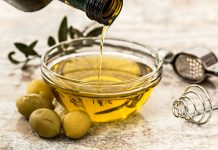
Since I cannot recommend specific brands which may or may not be in your grocery stores, I will tell you which margarine to look for in the grocery store. The cholesterol is lowest in margarine made with liquid oil from safflower, sunflower, cottonseed, soybean or corn. Read the label and look for one of these oils listed as the first ingredient.
If the label says hydrogenated or partially hydrogenated, it contains some saturated fat. Margarine is hydrogenated for convenience to make it stay in a convenient stick form. This process of hydrogenation makes the margarine higher in saturated fat and trans fat. People who eat foods high in saturated fats and cholesterol tend to have higher blood cholesterol levels and an increased chance of having a heart attack.
To answer your second question, yes it is important for you to use low cholesterol margarine especially considering your family history. You should also drink only skim or fat-free milk, cut all fat off your meat, limit meat to 6 ounces per day and limit egg yolks to two per week. Because some people’s eating plans are high in animal fats, they need margarine, oils and salad dressings made with polyunsaturated oils to help offset the negative effects of saturated fats found in foods from animal sources like meat and dairy. But all fat from all sources should be limited to less than 6 teaspoons per day. Try limiting added fats and dressings to 2 teaspoons per meal at each of 3 meals per day.
Even though you don’t think you use much butter, most people do not count how many sticks of butter they use per week. Divide the number of sticks you use per week by how many people ate that week. This might surprise you especially if you do a lot of cooking or baking with butter. Butter contains saturated fat. Also, you haven’t considered the invisible cholesterol (marbling in meats, egg yolks, liver, ice cream, lunchmeats and sausages) that contribute a significant amount of cholesterol. You would do better to eliminate the visible cholesterol in butter and limit your intake of the invisible cholesterol found in fatty meats, whole, 2 percent and 1 percent milk.
A heart attack doesn’t just happen one day because of what you ate. It is the result of your life long eating habits, weight control, exercise and genes. It’s not too late for you to work to prevent a heart attack. Start today because you didn’t get to choose parents who had a low risk of heart disease.



